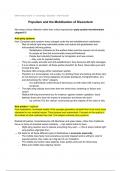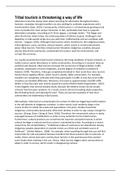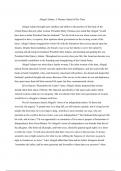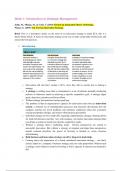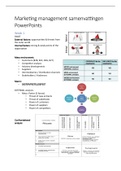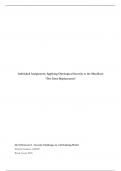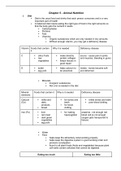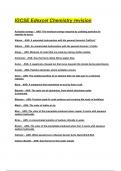GPSP week 6 lecture 12 - donderdag 7 december - André Krouwel
Populism and the Mobilisation of Discontent
We reward critical reflection rather than critical reproduction party system transformation
chapter!!!!!
Anti-party systems
How: European party systems have changed under the anti-establishment mobilisation.
- Rise of radical right-wing nationalist parties and radical anti-globalisation and
anti-austerity left-wing parties.
- Globalisation hollowed out the welfare states and this caused a lot of anxiety
for people as they feel economically insecure/threatened.
- People feel culturally threatened by immigration and new-comers.
→ they vote for populist parties.
- They are usually anti-elite and anti-establishment, they denounce left-right cleavages
- It is an attack on pluralism: all these parties shouldn’t be there, these elites just want
to keep their jobs
- Populists often emerge within mainstream parties
- Populism is a moral appeal, not a policy, by dividing those who belong and those who
do not belong in very strong categories of people (bad/good, immigrant/native, etc.)
and demonising the “other” category.
- It is authoritarian undermining of democracy on both sides with in-group and
out-group.
- The right wing radicals have been here the whole time, bordering on facism and
racism
- Radical left-wing movements too for instance: against modern capitalism. Issue
between those who have the means of production and those who don't.
- Up until the 70’s the ‘radical’ communists got the majority of the votes in Italy
New politics - Inglehart
Post materialism: increased wealth of the younger generation caused them to be much more
interested in non material issues. They became post materialists. Focused on the quality of
life instead of what materials they had. This helped unfreeze party systems.
Radical left parties: characterised by left-libertarian and green ideas, rather than traditional
focus on forms of industrial worker solidarity → had radical starts to them.
- Right-wing reaction was to oppose everything they said —> this is where radical right
wing parties originated from
→ the basis for all these different types of backlashes is economic insecurity
- The middle class feels more precarious (poverty trapped) and is willing to vote for
populist parties; they make up a big part of our civilisation.
- The middle and worker class aligning: mass parties and push for democracy.
- Elites and middle class aligning: facism.
, Radical right
The middle right with a cultural and economical appeal, they syphon off of the
pro-democratic working class and middle class to vote for populistic parties.
- The pro-democratic coalition: mass parties emerged, freezing of the pol system: a
large group who was excluded by politics emerged and mobilised large parties of
civilisation. They integrated everybody into the political system.
- Pro-democratic parties are eroding because populists are
- Populists are undermining a pro-democratic democracy and therefore are the
end of democracy
- OR the radical right is the solution to democracy because we need a party
who will protect people from globalisation
Political mobilisation of discontent
A lot of people do not like the rule of law because they feel like it doesn’t protect them.
- They don't like equality because they feel like immigrants don't deserve the same
social rights → they want to distinguish between social groups
- Populism is a thin centred ideology that considers society to be ultimately separated
into two homogenous and antagonistic groups: “pure people” versus “the corrupt
elite”
- Populists are the best at mobilising groups or people that didn’t fit in anywhere else.
Pluralism: societies are built up of multiple social groups with different ideas and interests
Elitism: people are dishonest and vulgar. The elite are superior in cultural, intellectual and
moral terms.
How does populism (work according to Andre).
It is a worldview of demarcation: there is always some sort of threat to the nation.
Four elements (2 homologies and 4 antagonisms)
- People: homogeneous
- Homogeneous: some sort of unity, often very vague
- Establishment: elites, the “bad guys”; they protect minorities, so they betray the
people. They protect people who are not worth protection.
- Populist leader: he is one with the people, he fights for them. He understands the
people. Resemblance representation. He understands them better than anyone.
knows exactly what they need
- He can represent all the people (because they are homogeneous and he is
one with them),
- Has a unique capacity to understand them,
- You cant represent all people if they're different, so “they are all the same”.
- They attack representative institutions, because they try to invoke the idea of
equality before the law.
- They don't want the rule of law, they want the rule of men (the
majority, the people, “us”).
- The outsider: enemy of the people, they are just bad and a threat. Ethnically and
religiously different group than the native people. It is justified to exclude them from
the majority of the population.
Populism and the Mobilisation of Discontent
We reward critical reflection rather than critical reproduction party system transformation
chapter!!!!!
Anti-party systems
How: European party systems have changed under the anti-establishment mobilisation.
- Rise of radical right-wing nationalist parties and radical anti-globalisation and
anti-austerity left-wing parties.
- Globalisation hollowed out the welfare states and this caused a lot of anxiety
for people as they feel economically insecure/threatened.
- People feel culturally threatened by immigration and new-comers.
→ they vote for populist parties.
- They are usually anti-elite and anti-establishment, they denounce left-right cleavages
- It is an attack on pluralism: all these parties shouldn’t be there, these elites just want
to keep their jobs
- Populists often emerge within mainstream parties
- Populism is a moral appeal, not a policy, by dividing those who belong and those who
do not belong in very strong categories of people (bad/good, immigrant/native, etc.)
and demonising the “other” category.
- It is authoritarian undermining of democracy on both sides with in-group and
out-group.
- The right wing radicals have been here the whole time, bordering on facism and
racism
- Radical left-wing movements too for instance: against modern capitalism. Issue
between those who have the means of production and those who don't.
- Up until the 70’s the ‘radical’ communists got the majority of the votes in Italy
New politics - Inglehart
Post materialism: increased wealth of the younger generation caused them to be much more
interested in non material issues. They became post materialists. Focused on the quality of
life instead of what materials they had. This helped unfreeze party systems.
Radical left parties: characterised by left-libertarian and green ideas, rather than traditional
focus on forms of industrial worker solidarity → had radical starts to them.
- Right-wing reaction was to oppose everything they said —> this is where radical right
wing parties originated from
→ the basis for all these different types of backlashes is economic insecurity
- The middle class feels more precarious (poverty trapped) and is willing to vote for
populist parties; they make up a big part of our civilisation.
- The middle and worker class aligning: mass parties and push for democracy.
- Elites and middle class aligning: facism.
, Radical right
The middle right with a cultural and economical appeal, they syphon off of the
pro-democratic working class and middle class to vote for populistic parties.
- The pro-democratic coalition: mass parties emerged, freezing of the pol system: a
large group who was excluded by politics emerged and mobilised large parties of
civilisation. They integrated everybody into the political system.
- Pro-democratic parties are eroding because populists are
- Populists are undermining a pro-democratic democracy and therefore are the
end of democracy
- OR the radical right is the solution to democracy because we need a party
who will protect people from globalisation
Political mobilisation of discontent
A lot of people do not like the rule of law because they feel like it doesn’t protect them.
- They don't like equality because they feel like immigrants don't deserve the same
social rights → they want to distinguish between social groups
- Populism is a thin centred ideology that considers society to be ultimately separated
into two homogenous and antagonistic groups: “pure people” versus “the corrupt
elite”
- Populists are the best at mobilising groups or people that didn’t fit in anywhere else.
Pluralism: societies are built up of multiple social groups with different ideas and interests
Elitism: people are dishonest and vulgar. The elite are superior in cultural, intellectual and
moral terms.
How does populism (work according to Andre).
It is a worldview of demarcation: there is always some sort of threat to the nation.
Four elements (2 homologies and 4 antagonisms)
- People: homogeneous
- Homogeneous: some sort of unity, often very vague
- Establishment: elites, the “bad guys”; they protect minorities, so they betray the
people. They protect people who are not worth protection.
- Populist leader: he is one with the people, he fights for them. He understands the
people. Resemblance representation. He understands them better than anyone.
knows exactly what they need
- He can represent all the people (because they are homogeneous and he is
one with them),
- Has a unique capacity to understand them,
- You cant represent all people if they're different, so “they are all the same”.
- They attack representative institutions, because they try to invoke the idea of
equality before the law.
- They don't want the rule of law, they want the rule of men (the
majority, the people, “us”).
- The outsider: enemy of the people, they are just bad and a threat. Ethnically and
religiously different group than the native people. It is justified to exclude them from
the majority of the population.

